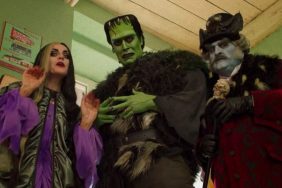When Ti West and AJ Bowen gave a Q&A after a Fantastic Fest screening of their latest movie, I asked a spoiler question about the end of the movie. That can’t be part of the interview, so I used it in a room full of people who had already seen the movie. It was a good answer too, very thoughtful and included some insight into the development process, namely an alternate ending West decided not to shoot. During the Q&A, West also addressed some quandries over whether The Sacrament was found footage or not, or even a horror movie, since it’s not supernatural.
Bowen plays Sam, a reporter for Vice who follows a man to a commune to visit his sister. Sam’s cameraman Jake (Joe Swanberg) try to get to the bottom of this isolated community. When West and Bowen hung around outside the theater for a private interview, I followed up on the non spoiler (or at least vague scene descriptions) questions about their movie.
Crave Online: The found footage or first person style sort of began as a way for filmmakers to break into the business, like The Blair Witch Project and Paranormal Activity. Now we’re seeing experienced filmmakers experiment with it. What is your take on experienced filmmakers experimenting in this style?
Ti West: For me it’s a two-part thing. One, I wanted to make a documentary but I didn’t have anything to make a documentary about, so I sort of invented something to make a documentary about. I think the term “found footage” is a weird term because it’s a genre, we all get what it means and I understand labeling this as it just so you can understand it’s shot sort of like that. But to me, found footage is movies that are supposed to be real or supposed to be in camera edited, like this is what was left on this tape. That’s never what this is.
This is an after the fact made documentary. It’s like a Christopher Guest movie if you will. It’s just very dark, and I don’t think anyone’s looked at Christopher Guest’s career and been like, “Oh, found footage.” It’s always been like these weird mockumentaries, but mockumentary sounds good for comedy and not for anything else. So it’s just hard to label it necessarily but to me, having a tough time labeling something generally means something’s interesting.
As far as going and doing it, I think it made sense for this content because this content was steeped enough in realism and video journalism that it made sense to present it in that way, in this sort of realistic vibe. Also in reference to Jonestown, NBC was there filming the night before the mass suicide to the point where the cameraman was even shot while filming. So it’s a unique story that does apply to it, and also to make this movie not in this perspective, not in a documentary style would have taken twice as long and twice as much money. So there’s a slight practicality too. Thankfully this content made sense for that and I was able to come up with a reason that I was comfortable with to do it. We tried really hard to find a way to make it cinematic despite it being a documentary.
AJ Bowen: It also seems like when you talk about it that way that it would’ve been incredibly wasteful, way less efficient to try to do it that way because you still would have had Joe running around with a camera on his shoulder the whole time and you’ve got to address him, then it’s this thing that we could just be using in a very mindful way. The photography is a huge part. It wasn’t like okay, just shoot some shit. Even the turns when we’re transitioning cameras, they were very choreographed about practice runs about get it around here, hit this angle, don’t show this.
Ti West: That’s why I made the characters, one of them is a cinematographer. That’s why the movie looks the way it is. One’s a photographer and one’s a videographer, whatever you want to call it. There’s very few moments that have that chaotic first person thing. For the most part it feels like an after the fact documentary.
Did Vice sign off on this?
Ti West: Yeah. I’m not that bold to put their logo in the movie and not tell them.
AJ Bowen: They knew where the Vice rings were the entire time. We couldn’t get extras.
Ti West: I went to them before the movie and said, “I want to include you in this movie.”
AJ, when we spoke about Grow Up, Tony Phillips we talked about that being your the grown up character in the movie. The Sacrament is the first time you’re playing, if not a father, an expectant father. Is that a big step for you?
AJ Bowen: I think it’s natural as we’re getting older. We’re getting into that age where we could be dads and eclipsing the area where that wouldn’t be something to naturally discuss. Also for us, Ti wanted to tie that in. It makes a believable transition for the character of Sam, as them being as unobtrusive as possible, there are rules to what they do. We’re going to immerse ourselves but we’re not going to try to alter what’s going on so it’s kind of a hands off approach. So you really need to earn the moment where Sam’s going to decide to try to take one of them out of there, so this concept of, “Well, he’s an expectant father.” Then when he talks to Savannah, the little girl, it keys into that a little bit more because it’s on his mind and there’s this innocent child. It would make sense for an expectant father, for that to supercede their work ethic.
Ti West: It was always meant that that would be his thing that he was sensitive about, and some of it got cut down but there’s still elements in there that he and Joe have probably been to a lot of fucked up places and they used to probably have no care in the world about it. Now that someone’s an expectant father, you always hear it, even yesterday when we saw Blue Ruin, in the Q&A they said, “Well, I’m a father now so I don’t think about killing people in creative ways as much anymore.” It’s something that immersing yourselves in these crazy environments, once you’re going to become a father, you start to get a little bit like, “Uh, maybe I don’t want to do this anymore.” So it was kind of playing with that idea of someone who used to be a really ballsy journalist is maybe on that transition of toning it back because there’s other things in his life that are important.
AJ Bowen: Yeah, you don’t know how many more times he’s going to actually go out in the field because now he’s got a kid to think about.
Now why would horror have to be supernatural? I’ve never heard that criteria before.
Ti West: It doesn’t have to be but I would say in general, if you look at this movie or a Manson family movie or Silence of the Lambs or Se7en, no one calls any of those movies horror. Silence of the Lambs is about a fucking cannibal and a serial killer. Se7en is about a weird mass murderer that’s killing people in creative ways. They’re very much horror movies but people don’t call them that. I don’t know why they don’t but they don’t. I think it’s the supernatural element.
In those examples, yes, but aren’t Saw or Hostel or AJ’s movies A Horrible Way to Die and You’re Next considered horror?
Ti West: I don’t know, A Horrible Way to Die is probably not necessarily one. I think Saw and You’re Next are these stylistically genre movies with scares and jump sounds, and it’s an onslaught on the characters in a different way. Saw is about you wake up in a contraption that’s going to completely rip you to pieces. It’s for an audience to have that horror feeling whereas those other movies, despite being equally as graphic in content, tonally don’t represent that.
AJ Bowen: Also in general, as a bigger philosophical thing, going in line with getting a little bit older, I’m starting to see less value in giving a conclusive answer. It’s not really my place as a storyteller, as a performer to tell people what it is anymore. That’s not for me to say if they want to call it a genre film, if they want to call it a non-genre film. That’s really a response that’s there for the audience. It’s not there for me to really have an opinion.
Ti West: To some degree it’s like who cares? It’s just a movie. The only reason is, to me it feels like a horror movie but in the month or so I’ve been to Venice, Toronto and here, I hear people debating about whether it is. I don’t really understand the effort to put the debate in but I’m not sitting here to say it’s not happening, but whatever.
And that’s a much more positive way to not qualify it. I was more worried you were coming from the perspective of being afraid to call it a horror movie.
Ti West: Oh no, not at all.
Was Joe Swanberg actually shooting?
Ti West: I shot most of it. He shot some, like when he’s running around the woods and has to hide, there’s nowhere I could’ve been to do that. So I would send him out and show him a path and show him what to do and I would be hiding in a tent somewhere camouflaged. I would say 90% of the movie I shot and then 10% he shot.
Was it important that you don’t actually show the baby, we only hear the sound of the baby?
Ti West: No, there’s maybe some element of taste that I put in there but also we didn’t have a baby to really do that with. I don’t know, for me it was really just about the impact of understanding that children were going in there so that was going to be a major part of what would maybe cause people to do it and what not. But no, you understand what’s happening without seeing it actually happen to a baby so I don’t really feel the need to exploit that.
How many takes of the static shot did you do?
Ti West: A lot. Probably 18 and it’s probably the 17th one that we used.
Is there a hidden cut in the fire scene, or is that a “cowboy fall” trick where you switch the performers?
Ti West: It’s more the latter, but there’s not a hidden cut. I shot that. It was really warm in there.
You call your company Slow Burn Productions?
Ti West: Peter Phok and Jacob Jaffke who produced the movie, they called it that kind of as a joke to me. So that way every day when I showed up and we would see the signs of where the set was, it’d be like “Slow Burn this way.” I’m fine with it but it was really an in joke for them.
Fred Topel is a staff writer at CraveOnline and the man behind Shelf Space Weekly. Follow him on Twitter at @FredTopel.









